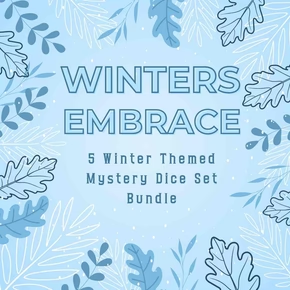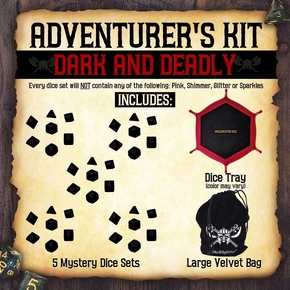
The Deck of Many Things 5e
Table of Contents:
Derailing Campaigns Since 1975
This innocuous deck of cards has had countless incarnations, starting all the way back in the very first Grayhawk supplement for 1st edition D&D. And while it has gone through various changes it has remained true to its core concept of throwing a big pile of chaos into a stale campaign. What does the deck do? How does it actually work? Pick a card if you dare as we go through everything you need to know.
What is The Deck of Many Things?
The D&D deck of many things 5E has gone through many iterations, sometimes it’s 13 cards, sometimes it’s 22 cards, sometimes they’re made of vellum and sometimes they’re made of ivory. The cards themselves are a lot like tarot cards, sharing the same back but each face bears a different symbolic figure.
What the deck is though is a whole heap of chaos. Whenever a player draws a card something happens depending on the card drawn then disappears. Some of the D&D deck of many things 5E campaign cards are good, some are bad, and some will completely derail your campaign.
Using the Deck as a DM
The deck of many things is a powerful artifact, there’s no real way for your players to acquire it unless you intentionally want them to have it. I’ve seen some DMs simply offer up the deck of many things as an option because it’s funny, and it totally can be for a short campaign. If you’re running a longer game or any sort of campaign where you care about the plot DO NOT USE IT.
The deck of many things is a useful tool for making a D&D 5E campaign exciting again, and generally livening up an adventure that has grown stale. It’s like throwing dynamite into a crowded room just to see what happens and should only be done when the alternative is players losing interest in your game.
Often, the deck will simply change the direction of your campaign. Drawing a card could mean an adventure to recover a player from an extradimensional space, a long adventure fighting against a malevolent devil or previously friendly NPC, or even a fight against one of the players as they suddenly turn evil. The deck isn’t going to make these adventures for you, but it does the groundwork for you to take the campaign in a new and interesting direction.
Want Endless Dice? Check out our Dice Subscription
Using the Deck as a Player
If you find yourself holding the deck of many things, you’ve got two options. Hide it away or go hog wild and start drawing. Each card could literally kill you, gain you a level, make you wildly wealthy, kill you, start a side-quest, enlist the aid of a faithful knight, kill you, drawing a card could instantly kill you.
Drawing cards from the deck is like playing Russian roulette, you could win big but the chances of just straight up dying are high. Only draw cards if you’re comfortable losing your current character.
The Deck of Many Things Itself
We’ve beaten around the bush enough though, what exactly does each card do? How does it technically function as a magic item? Here’s the current rules for the 5th edition deck of many things:
Deck of Many Things
Wondrous Item, legendary
Usually found in a box or pouch, this deck contains a number of cards made of ivory or vellum. Most (75 percent) of these decks have only thirteen cards, but the rest have twenty-two.
Before you draw a card, you must declare how many cards you intend to draw and then draw them randomly (you can use an altered deck of playing cards to simulate the deck). Any cards drawn in excess of this number have no effect. Otherwise, as soon as you draw a card from the deck, its magic takes effect. You must draw each card no more than 1 hour after the previous draw. If you fail to draw the chosen number, the remaining number of cards fly from the deck on their own and take effect all at once.
Once a card is drawn, it fades from existence. Unless the card is the Fool or the Jester, the card reappears in the deck, making it possible to draw the same card twice.
Balance. Your mind suffers a wrenching alteration, causing your alignment to change. Lawful becomes chaotic, good becomes evil, and vice versa. If you are true neutral or unaligned, this card has no effect on you.
Comet. If you single-handedly defeat the next hostile monster or group of monsters you encounter, you gain experience points enough to gain one level. Otherwise, this card has no effect.
Donjon. You disappear and become entombed in a state of suspended animation in an extradimensional sphere. Everything you were wearing and carrying stays behind in the space you occupied when you disappeared. You remain imprisoned until you are found and removed from the sphere. You can't be located by any divination magic, but a wish spell can reveal the location of your prison. You draw no more cards.
Euryale. The card's medusa-like visage curses you. You take a −2 penalty on saving throws while cursed in this way. Only a god or the magic of The Fates card can end this curse.
The Fates. Reality's fabric unravels and spins anew, allowing you to avoid or erase one event as if it never happened. You can use the card's magic as soon as you draw the card or at any other time before you die.
Flames. A powerful devil becomes your enemy. The devil seeks your ruin and plagues your life, savoring your suffering before attempting to slay you. This enmity lasts until either you or the devil dies.
Fool. You lose 10,000 XP, discard this card, and draw from the deck again, counting both draws as one of your declared draws. If losing that much XP would cause you to lose a level, you instead lose an amount that leaves you with just enough XP to keep your level.
Gem. Twenty-five pieces of jewelry worth 2,000 gp each or fifty gems worth 1,000 gp each appear at your feet.
Idiot. Permanently reduce your Intelligence by 1d4 + 1 (to a minimum score of 1). You can draw one additional card beyond your declared draws.
Jester. You gain 10,000 XP, or you can draw two additional cards beyond your declared draws.
Key. A rare or rarer magic weapon with which you are proficient appears in your hands. The GM chooses the weapon.
Knight. You gain the service of a 4th-level fighter who appears in a space you choose within 30 feet of you. The fighter is of the same race as you and serves you loyally until death, believing the fates have drawn him or her to you. You control this character.
Moon. You are granted the ability to cast the wish spell 1d3 times.
Rogue. A nonplayer character of the GM's choice becomes hostile toward you. The identity of your new enemy isn't known until the NPC or someone else reveals it. Nothing less than a wish spell or divine intervention can end the NPC's hostility toward you.
Ruin. All forms of wealth that you carry or own, other than magic items, are lost to you. Portable property vanishes. Businesses, buildings, and land you own are lost in a way that alters reality the least. Any documentation that proves you should own something lost to this card also disappears.
Skull. You summon an avatar of death--a ghostly humanoid skeleton clad in a tattered black robe and carrying a spectral scythe. It appears in a space of the GM's choice within 10 feet of you and attacks you, warning all others that you must win the battle alone. The avatar fights until you die or it drops to 0 hit points, whereupon it disappears. If anyone tries to help you, the helper summons its own avatar of death. A creature slain by an avatar of death can't be restored to life.
Avatar of Death
Medium undead, neutral evil
Armor Class 20
Hit Points half the hit point maximum of its summoner
Speed 60 ft., fly 60 ft. (hover)
|
STR |
DEX |
CON |
INT |
WIS |
CHA |
|
16 (+3) |
16 (+3) |
16 (+3) |
16 (+3) |
16 (+3) |
16 (+3) |
Damage Immunities necrotic, poison
Condition Immunities charmed, frightened, paralyzed, petrified, poisoned, unconscious
Senses darkvision 60 ft., truesight 60 ft., passive Perception 13
Languages all languages known to its summoner
Challenge -- (0 XP)
Incorporeal Movement. The avatar can move through other creatures and objects as if they were difficult terrain. It takes 5 (1d10) force damage if it ends its turn inside an object.
Turning Immunity. The avatar is immune to features that turn undead.
Actions
Reaping Scythe. The avatar sweeps its spectral scythe through a creature within 5 feet of it, dealing 7 (1d8 + 3) slashing damage plus 4 (1d8) necrotic damage.
Star. Increase one of your ability scores by 2. The score can exceed 20 but can't exceed 24.
Sun. You gain 50,000 XP, and a wondrous item (which the GM determines randomly) appears in your hands.
Talons. Every magic item you wear or carry disintegrates. Artifacts in your possession aren't destroyed but do vanish.
Throne. You gain proficiency in the Persuasion skill, and you double your proficiency bonus on checks made with that skill. In addition, you gain rightful ownership of a small keep somewhere in the world. However, the keep is currently in the hands of monsters, which you must clear out before you can claim the keep as yours.
Vizier. At any time you choose within one year of drawing this card, you can ask a question in meditation and mentally receive a truthful answer to that question. Besides information, the answer helps you solve a puzzling problem or other dilemma. In other words, the knowledge comes with wisdom on how to apply it.
The Void. This black card spells disaster. Your soul is drawn from your body and contained in an object in a place of the GM's choice. One or more powerful beings guard the place. While your soul is trapped in this way, your body is incapacitated. A wish spell can't restore your soul, but the spell reveals the location of the object that holds it. You draw no more cards.
Using a Physical Deck
You can easily substitute die rolls for card draws but drawing from a physical deck is a bit of roleplaying theater your players will likely never forget. If you’re willing to go all out (or you’re planning on making the deck a central part of your adventures) consider buying a physical deck that your players can actually draw from. The early versions of the classic 22 card deck have become strangely hard to find, but I recommend this version from “The Deck of Many”, an entire company named after the iconic item.
If you want to get the theater without spending anything, you can also simulate the deck of many with a deck of common playing cards. Use the following table for a simple substitution:
|
Playing Card |
Deck of Many Card |
|
Ace of Diamonds |
Vizier* |
|
King of Diamonds |
Sun |
|
Queen of Diamonds |
Moon |
|
Jack of Diamonds |
Star |
|
Two of Diamonds |
Comet* |
|
Ace of Hearts |
The Fates* |
|
King of Hearts |
Throne |
|
Queen of Hearts |
Key |
|
Jack of Hearts |
Knight |
|
Two of Hearts |
Gem* |
|
Ace of Clubs |
Talons* |
|
King of Clubs |
The Void |
|
Queen of Clubs |
Flames |
|
Jack of Clubs |
Skull |
|
Two of Clubs |
Idiot* |
|
Ace of Spades |
Donjon* |
|
King of Spades |
Ruin |
|
Queen of Spades |
Euryale |
|
Jack of Spades |
Rogue |
|
Two of Spades |
Balance* |
|
Joker (With ™) |
Fool* |
|
Joker (Without ™) |
Jester |
* Found only in a deck with twenty-two cards
--
Enjoy this Guide? You May Also Like:
Need a New Dice Set? Check out our DND Dice here. They are perfect for every gamer as a gift or just treating yourself!
Thinking about other classes? Check out our giant list of D&D 5e Tools and Tips here.
New to find a D&D Group? Check out our guide on How to Find a D&D Group.
Want to learn more about the gods in D&D? Check out our Deities 5e Guide
Know a PC that just wants to watch the world burn? They might be Chaotic Neutral

Disclaimer
Last updated: January 27, 2019
The information contained on www.SkullSplitterDice.com website (the "Service") is for general information purposes only.
www.SkullSplitterDice.com is a participant in the Amazon Services LLC Associates Program, an affiliate advertising program designed to provide a means for sites to earn advertising fees by advertising and linking to Amazon.com. (source: Section 5)
Blueshift Nine, LLC assumes no responsibility for errors or omissions in the contents on the Service.
In no event shall Blueshift Nine, LLC be liable for any special, direct, indirect, consequential, or incidental damages or any damages whatsoever, whether in an action of contract, negligence or other tort, arising out of or in connection with the use of the Service or the contents of the Service. Blueshift Nine, LLC reserves the right to make additions, deletions, or modification to the contents on the Service at any time without prior notice.
Blueshift Nine, LLC does not warrant that the Service is free of viruses or other harmful components.
Affiliate disclaimer
This affiliate disclosure details the affiliate relationships of Blueshift Nine, LLC with other companies and products.
Some of the links are "affiliate links", a link with a special tracking code. This means if you click on an affiliate link and purchase the item, we will receive an affiliate commission.
The price of the item is the same whether it is an affiliate link or not. Regardless, we only recommend products or services we believe will add value to our readers.
By using the affiliate links, you are helping support the Service, and we genuinely appreciate your support.
Affiliate advertising programs that the Service uses are:
- Amazon Services LLC Associates Program
- As an Amazon Associate, I earn from qualifying purchases.
- Blueshift Nine, LLC is a participant in the Amazon Services LLC Associates Program, an affiliate advertising program designed to provide a means for sites to earn advertising fees by advertising and linking to Amazon.com or endless.com, MYHABIT.com, SmallParts.com, or AmazonWireless.com.
- Pages on this Service may include affiliate links to Amazon and its affiliate sites on which the owner of this Service, Blueshift Nine, LLC, will make a referral commission.



